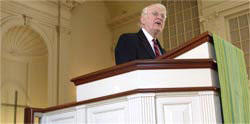“The most distinguished part of the Constitution is the separation of church and state,” Ron Flowers, the John F. Weatherley Emeritus Professor of Religion, said Wednesday.Flowers was part of the first “Celebration of the Constitution” at TCU. About 20 people attended the event, which focused on religious freedom in the First Amendment and the intent of the Constitution’s founders.
Donald Jackson, professor of political science, said Congress passed a requirement that any university receiving federal funds for pro-secondary education, such as student loans, will hold a program about the Constitution on Sept. 17 or within a few days.
The service, held in Robert Carr Chapel commemorated Sept. 17, 1787, when the founders signed the Constitution.
Jackson, who coordinated the event, said Flowers was chosen as a speaker because he is a national expert on religious freedom.
Centuries of religious persecution, Flowers said, created the need for religious protection.
The authors of the Constitution were aware of the history of persecution and resolved that it wouldn’t happen in America, Flowers said.
“They avoided that result by avoiding the beginning,” Flowers said.
The founders made religious persecution illegal by creating the establishment policy and the free exercise clause in the first two clauses of the First Amendment. The policy and clause allow people to act out their religious beliefs without government interference.
Flowers gave an example of how the founders thought about separation of church and state.
“The right to choose religion is conscious and government doesn’t have authority to rule over consciousness,” Flowers said, quoting James Madison.
The struggle for religious freedom provided a way for other freedoms to come about, such as freedom of speech, freedom of the press and freedom of assembly, Flowers said.
Once the founders gave the citizens religious freedom, they were ready to give other freedoms, he said.
Caitlin Pierce, a freshman advertising/public relations major, said the event gave recognition of an important document.
“It’s a good way to recognize an important amendment and part of our country,” Pierce said. “It’s vital to our institution.

